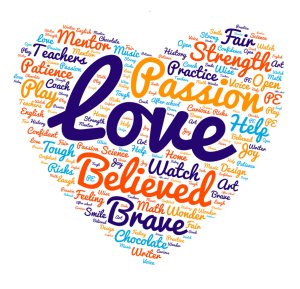6 Traits of Life-Changing Teachers
We asked our community what makes teachers unforgettable. Here’s what they said.
Michael Foley, my high school Shakespeare teacher, was a known tyrant. As underclassmen, my friends and I would walk past his closed door, peer in the narrow vertical window, and see him gesticulating wildly at some hapless senior, blood vessels popping in his forehead.
We were genuinely terrified.
I would eventually discover that Foley wasn’t up there tearing into a student. He was channeling Othello, consumed with jealousy and demonstrating how pettiness can destroy even the most powerful of leaders. Foley did this with all of Shakespeare’s works, pulling out the most impactful bits and pouring his heart into them: impish Puck, Juliet at death’s door, and the gravedigger, woefully regarding Yorick’s skull.
For me, at least, terror became inspiration. I’ve never forgotten him.
In education there’s a lot of talk about standards, curriculum, and assessment—but when we ask adults what they remember about their education, decades after they’ve left school, the answers are always about their best teachers. So what is it about great educators, like the theatrical Michael Foley, that leaves such an indelible impression? If the memory of curriculum and pedagogy fades with time, or fails to register at all, why do some teachers occupy our mental landscape years later? We started getting curious: What are the standout qualities that make some teachers life changers?
To answer this question, we asked our Facebook community directly. Over 700 responses poured in from teachers, parents, and students. When we analyzed the responses, some clear patterns began to emerge, across all age ranges and geography—even subjects.
Life-Changing Teachers Help Their Students Feel Safe
The research is unequivocal: People can’t learn if they’re anxious, frightened, or in trauma. Safety is part of the education starter kit. Unsurprisingly, many of our readers recalled that the best teachers establish a culture of safety and support in their classrooms, whether it’s physical, emotional, or intellectual.
Kristina Gorsuch Modaff describes her third-grade teacher, Mrs. Hilier, as having “a calming presence. She made me feel safe. She made me feel confident.” And when a student’s home life is less certain, school can be a welcome oasis: Jacqueline McDowell fondly remembers that her sixth-grade teacher “was constant and stable—she saw the whole me and was steady when other things in my life were not.”
And there were numerous stories of children with learning disabilities who found a haven and encouragement with a supportive teacher. Amy Rottmann’s high school creative writing teacher, Mrs. Harris, “made the quiet girl in the back with dyslexia realize she had a voice through poetry.”

Life-Changing Teachers Possess a Contagious Passion
A passion for education is in the blood of the best teachers—the word passion showed up 45 times in our audience responses—and the best teachers pass it on to students.
Math teacher Dave Bock’s passion for his material was “contagious,” recalled Jennifer Reese. “He delivered engaging lessons that piqued our curiosities, and gave us time to puzzle through solutions in our own ways.” Far away from math class, Lisa Maree Wiles thanked David Sidwell, her music teacher who gave his students “a love for music, a respect for our craft, and the passion to always be the best we could be!” And at least one teacher’s passion was ahead of its time: Jessica Chiado Becirovic remembers her senior year English teacher, Anne Godin, who “staunchly advocated for introducing her classes to multicultural literature before it was seen by many as important and valuable. She was a pioneer with a rebellious spirit.”
Life-Changing Teachers Model Patience
Learning can be slow and messy. Classrooms are filled with students—sometimes more than 30 at a time—who arrive each day with different emotional needs, and learn at wildly different speeds. Remarkably, life-changing teachers find a way to stay calm amid the chaos and play the long game, giving their students the time and support they need to learn.
Judy Barrera remembers Bernie Griff, her third-grade teacher. “He... went to the high school to get me books to read, and was the most patient teacher I have ever had. He gave me so much while I probably gave him a headache!” Some teachers don’t just model patience, but teach it as a life skill: “As a student I was always in a rush to see results and I made lots of mistakes,” said James R. Lamb. “Mr. Ingram taught me to slow down and keep my thinking ahead of the work.”
And long before learning from mistakes was supported by research, high school algebra teacher Susan Gilkey calmly taught her students that it was “OK to make mistakes, learn from them, and try again. She never made kids feel bad about it,” recalls Karen Spencer, a former student. “I hope I make her proud now that I carry on that same thinking with my middle school math students.”
Life-Changing Teachers Know When to Be Tough
If life-changing teachers are patient, they also know when to change gears and get tough. They’re the teachers who challenge us to be better students and better humans—and then up the ante and demand that of us.
For Claire Bush, that someone was Mr. Zimmermann, her 12th-grade English teacher. “I’d finish my work and then goof off. He was the only one who actually called me on my crap and challenged me. Being challenged actually helped me reach my potential. Now I’m an English teacher. I wish I had the chance to thank him.”
Tough teachers don’t just hold students to high standards in the classroom—some kick their students out of the nest. Heather Miles remembers teacher Allan Edwards, who expanded her horizons and always “gave his English students rigorous content and pushed us to see beyond the small town in which we lived. He believed that we could always do more, and taught us to never settle.” And Barbara Minkler praises French teacher Mr. Smith: “He respected us, yet challenged us to reach our potentials. He stretched us with French existential literature. We had to give speeches, put on plays, and individually meet pronunciation and writing goals. He laughed with us, got mad and frustrated with us, and celebrated with us.”
Life-Changing Teachers Believe in Their Students (and Help Them Believe in Themselves)
The power of a teacher’s simple, unequivocal belief in a student was mentioned almost 70 times by respondents. Most of us have had some sort of self-doubt, but many students are crippled by it. Life-changing teachers have the gift of seeing potential in kids when others don’t, and then have the perseverance to help the children find it within themselves.
High school biology teacher Mr. Kyriakos was the one who helped Rachel Poff find her strengths: “He taught me that I was smart. I just needed to believe in myself. He died while I was his student and I cried like he was family. He changed my life.”
Laura Reilly Spencer’s teacher Libby Sciandra Cowan not only helped build her confidence as a student, but inspires her teaching practice to this day. “She believed that I could do great things, and I came to believe that, too. I hope I am half the teacher to my students that she was to me.”
Supportive advocates aren’t always teachers. Counselors and coaches can play this pivotal role as well. Nick Tutolo’s former coach, Jeff Ewing, continues to inspire him nearly 20 years later. “He valued teamwork, hard work, and pride. For a kid who was struggling to figure out where I fit, this went a long way.”
Life-Changing Teachers Love Their Students
Respondents used the word love a whopping 187 times (and that’s not counting an additional 157 heart emojis). Showing love for students—through small but meaningful gestures of kindness—is far and away the most impactful thing life-changing teachers do.
When Michelle Moyle was sick in bed, her fourth-grade teacher, Liz Thomas, arrived at her house with a stack of books to cheer her up—a gesture Michelle remembers some 38 years later. (If home visits are too hard, a positive phone call can do the trick.)
Kayla McNeil’s second-grade teacher, Kathy Nygren, showed her feelings for her students through her playful spirit. “She really loved all us kids. You could tell in the way she taught us, making learning fun by dressing up as a dinosaur or pilgrim. You never knew what was in her bag of tricks.”
Students can also feel a teacher’s love in something as simple as pronouncing their name correctly. Jena’ Lowry’s family moved all the time; she remembers how teachers used to constantly mispronounce her name. She was dreading it yet again on the first day of her 11th-grade English class, but her new teacher, Mrs. Holman, pronounced her name perfectly. “I was speechless,” Jena’ recalls. “She addressed us as if we each meant something to her. She captured our hearts, therefore she had our minds.”
Taking a step back, it appears that the most direct and longest-lasting way to reach a child—to really make a difference in his or her life—is through so-called noncognitive dimensions like passion, patience, rigor, and kindness. And when students are lucky enough to find a life-changing teacher, the benefits last a lifetime. In many cases, those students take up the vocation themselves: 145 of the people who responded to our question had become teachers, passing the gift of education forward to the next generation.
As the Fool in Twelfth Night says, “There is no darkness but ignorance.” Thanks to all who are bringing the light.
